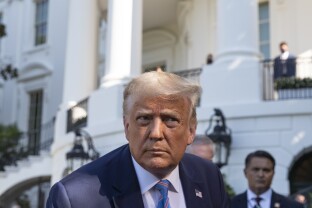President Donald Trump’s new tariffs are intended to encourage companies to manufacture their products in the United States. But instead, they are actively pushing some American companies away.
Some American manufacturers still rely on supply chain inputs from other countries and have now seen their operating costs skyrocket. Some of them are eyeing other locations as a new home base, simply to keep their businesses alive. Others are hoping Trump will reverse course or that domestic companies can start providing cheaper sourcing alternatives soon.
The small space satellite company Quub, which makes its products in Lancaster, Pennsylvania — the kind of place where Trump says he wants more companies to build factories — is one such company. Quub’s founder Joe Latrell told NOTUS that Trump’s tariffs could ultimately erase the company’s profit margins entirely.
It’s not that Quub doesn’t want to buy American-made parts — it’s that it’s nearly impossible to do so for some components.
“There’s nobody here in the United States that can make what we need,” Latrell told NOTUS. “If they existed, I would buy it.”
Latrell is now eyeing an international move to help his bottom line.
“We get our processors out of the U.K.,” he said. “We get some of our boards from Germany. We get our motors from Germany for our reaction wheels. We have precision parts made in Taiwan. By the time you add all this up — we’re considering putting the factory in the United Kingdom, because, short-term, I don’t have as much of a tariff hit as I would continuing to function here in the U.S.”
Other companies based in America are facing the same dilemma. Many are looking at Mexico as an alternative: “The raw materials cost thanks to the crazy China tariffs are supercharging Mexico as a magnet for U.S. manufacturing,” a lobbyist who is in touch with firms responding to the tariffs told NOTUS. “Set up shop on the other side of the border and you can circumvent most of those costs.”
Jimmy Donaldson, otherwise known as the YouTube personality MrBeast, has also pointed out the unintended consequences of Trump’s tariffs.
“Ironically because of all the new tariffs it is now way cheaper to make our chocolate bars we sell globally NOT in America because other countries don’t have a 20%+ tariff on our cogs,” he wrote in a social media post last week, describing the tariffs as a “random price hike.”
“I feel bad for small businesses,” he wrote. “Could really be a nail in the coffin for them.”
Trump has imposed new tariffs on most foreign products. He first imposed 25% tariffs on most products from Canada and Mexico, as well as 25% tariffs on metals from around the globe. This month he rolled out a plan to impose severe tariffs on most of the world — only to pause that plan days later after the markets started to melt — and left a 10% tariff on most countries instead while the U.S. negotiates new trade deals. The exception: China, which Trump hit with a 125% tariff on top of an existing 20% tariff.
American companies importing goods usually pay tariffs rather than foreign companies, meaning the policy is essentially a tax hike. Companies often pass on increased costs from tariffs to consumers in the form of higher prices. Broader price planning for companies has been difficult, however, as Trump frequently changes course.
Even manufacturers who thought they would be insulated from the tariffs are finding out they aren’t. Jonathan Sessa, founder of the laser cutting and sheet metal company Fabworks, initially said his company wouldn’t have to raise prices due to the tariffs because its work is done in California.
On Monday, he offered an update: “This aged so poorly,” he wrote. “Got slapped with a 50% increase on 6061-T6 [an aluminum alloy] today from our go-to vendor.” (Sessa followed that news up with a skull emoji.)
Comments from small businesses in response to the administration’s move reinforce fears about whether they can survive the new fees.
“Our company employs five (5) people across the Western United States, and we operate in industries that are deeply reliant on a global manufacturing base,” Jonathan Campbell, the CEO of Intermountain Mining Technologies, wrote in a letter to U.S. Trade Representative Jamieson Greer last month.
“Unlike some sectors that have domestic alternatives, we do not have the ability to shift our sources of supply,” Campbell continued. “Tariffs on essential materials and components directly increase our costs, which inevitably get passed down to our customers and ultimately to the end users.”
Tech billionaire Elon Musk’s company, Tesla, has also voiced concerns — even while Musk serves as a close adviser to Trump. Musk has vocally opposed the tariffs and criticized Trump’s trade adviser Peter Navarro in particular).
In the company’s own letter to Greer, a Tesla representative emphasized that many of Tesla’s electric vehicle components are manufactured and assembled in the United States. Tesla makes and assembles products in California, Texas, Nevada, New York, Minnesota and Michigan, according to the letter.
But critical components come from elsewhere: “Even with aggressive localization of the supply chain, certain parts and components are difficult or impossible to source within the United States,” Tesla’s representative, Miriam Eqab, wrote.
Trump isn’t backing away from his view that the entire American economy needs an overhaul.
“What has been exposed is that we need to make products in the United States, and that we will not be held hostage by other Countries,” he wrote on Sunday.
—
Haley Byrd Wilt is a reporter at NOTUS.
Sign in
Log into your free account with your email. Don’t have one?
Check your email for a one-time code.
We sent a 4-digit code to . Enter the pin to confirm your account.
New code will be available in 1:00
Let’s try this again.
We encountered an error with the passcode sent to . Please reenter your email.


